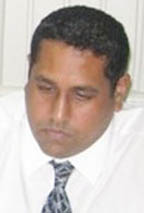By Gaulbert Sutherland
Iwokrama received US$100,000 last year under its forest deal with Canopy Capital (CC) with the sum received used to support measurement and valuation of Iwokrama’s ecosystem services.

The United Kingdom-based Canopy Capital signed a ground-breaking agreement in March 2008 with the Iwokrama International Centre (IIC) to purchase the rights to environmental services generated by Iwokrama’s 371,000-hectare rainforest reserve. This has set a precedent for a financial firm betting that the services generated by a living rainforest, will see compensation in international markets. These services include rainfall generation, climate regulation, biodiversity maintenance and water storage.
In 2008, the money received from Canopy Capital amounted to eight per cent of Iwokrama’s revenue stream. The figure last year amounted to five per cent. The entity’s Chief Executive Officer Dane Gobin said the sums received have been used to improve Iwokrama’s operational, scientific and local community capacity. Gobin would not disclose the amount received. “The licence fee (a series of annual payments) that CC agreed to pay remains confidential, at least for the time being,” he told Stabroek News. The figures obtained by this newspaper were gleaned from Iwokrama’s Annual Report. Iwokrama’s 2009 audited accounts revealed total annual income of US$2,232,649 against total expenditure of US$1,885,207.
“The sums received have been used to improve Iwokrama’s operational, scientific and local community capacity and so contribute to progress towards improving the centre’s financial strength. For example, funds have gone to support management planning for communities, training and capacity building programmes for communities, the installation of weather and climate monitoring instruments and support of the development of the Iwokrama research programme, amongst other areas,” Gobin said in an email responding to questions.
“We always assumed taking the CC deal forward as a basis for a longer term arrangement would be a long haul, given the challenging international financial situation since 2008, and the slow progress of the international climate change negotiations. However, Iwokrama and all of its international partners, including CC, have not been put off and are continuing to work hard (in close collaboration with the Guyana government) to seek a longer term financial arrangement of benefit to the centre and its communities. We are confident that in due course these efforts will succeed. In the meantime, we all have to be patient,” he continued.
Under the deal, Iwokrama is to receive funding for five years from Canopy Capital to value its climate services. Ninety per cent of investment returns in the long term will go towards sustainably managing this rainforest.
Canopy Capital has said that it is simply buying the licence to measure and then value the ecosystem services provided by the Iwokrama Forest for a period of five years by making a guaranteed yearly payment to IIC. It had said that the agreement is about using income from the ecosystem services to make Iwokrama financially independent from institutional donors by 2010 in accordance with its business plan. Canopy Capital had explained that the guaranteed initial income would be used by the IIC to continue the sustainable management and conservation of the Iwokrama reserve and to provide livelihoods for the local communities that have depended on the Iwokrama forest for generations.
As to the question of how Canopy Capital would make money, the company had said that it is exploring various approaches to securing substantial investment in ecosystem services. “In particular, Canopy Capital is looking to market eco-system services through an Ecosystem Service Certificate attached to a ten-year tradable bond, the interest from which will pay for the maintenance of the Iwokrama forest,” it had said.
In its Annual Report for last year, Iwokrama said Canopy Capital’s payments – the first ever private payments for ecosystem services made with the intent of generating financial returns – have already enabled the further protection and sustainable use of the forest to the benefit of the communities. It said, in 2009, the centre built on this significant agreement by seeking – through its practical work and international relationships, and in close consultation with the Guyana Government whose Low Carbon Development Strategy the IIC strongly supports – a longer term financial basis to: Guarantee the ongoing security of the forest and its communities; Develop further the concept of forest entrepreneurship; and lay the basis for a new class of asset management by establishing a financial mechanism which recognises the value of the ecosystem services of the forest.
“As you also know, the arrangement (with Canopy Capital) does not include a sale of any part of the Iwokrama Forest whatsoever and the centre’s management and Board of Trustees always had and still has complete control and responsibility for the management of the Iwokrama Forest,” Gobin said. “As new developments take place, we would be happy to share them with the press,” he added.
Guyana is currently involved in several forest projects and last November inked a deal with Norway, which could see Oslo providing up to US$250 million for this country to preserve its forests. Placing a value on climate services generated by areas like Iwokrama will be heavily dependent on the progress made in international climate change talks, sources noted. With the disappointing results from the Copenhagen summit last year much is riding on the upcoming meeting in Mexico.
Last Thursday, GAP/ROAR Member of Parliament Everall Franklin asked Prime Minister Samuel Hinds whether an agreement has been made/signed with a private company and Iwokrama with respect to the sale of eco-system services in that area and the Prime Minister responded “no”.
The Iwokrama forest in central Guyana was set aside in 1989 by the late president Desmond Hoyte for experiments on sustainable forestry and related matters. Over the more than two decades of its existence Iwokrama has struggled to find funding sources and to attract investments.





